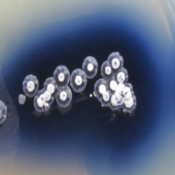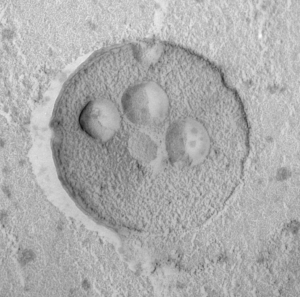Energetic Metabolism of Streptomyces
Study of the Regulation of Antibiotic Biosynthesis in Streptomyces species
Overview
The group “Energy Metabolism of Streptomyces” (MES) investigates the impact of phosphate availability on antibiotics biosynthesis in the bacteria Streptomyces using S lividans and S. coelicolor as model strains. These two strains are phylogenetically closely related but have very different abilities to produce the same antibiotics (Calcium Dependent Antibiotic/CDA, Undecylprodigiosin/RED and Actinorhoddin/ACT). Combining genetic, physiological, biochemical, metabolomic, lipidomic and proteomic approaches, the group MES attempts to understand WHY, WHEN and HOW these “secondary” or “specialized” metabolites, are being produced? In other terms, what are the conditions triggering their production? What are the links between this “specialized” metabolism and primary metabolism and more specifically lipid metabolism and what is the function, for the producing bacteria, of these usually bio-active metabolites, in the specific context of their production.
Research highlights
Antibiotics are involved in the regulation of the energetic metabolism of the producing bacteria
https://www.mdpi.com/2079-6382/9/2/83
Streptomyces belong to the Actinomycetales order. They are Gram + filamentous bacteria, living in the superficial layers of land or sea soils. These bacteria actively contribute to the fertility of these soils as well as to plants nutrition and health thanks to their ability to degrade a number of organic molecules of animal or vegetal origin and to produce molecules able to inhibit growth of phytopathogenic agents. In addition, these bacteria are responsible for the production of approximately 2/3 of the antibiotics in common use as well as that of many other bioactive molecules useful for human health (anti-cancer, anti-inflammatory, anti- obesity…) or agriculture (anti-fungals, pesticides, herbicides…). It has long been known that the production of most antibiotics usually takes place when growth slows down or stops because of nutritional limitations and that a limitation in phosphate is a major trigger of antibiotics biosynthesis. The coincidence of growth slow down, probably linked to an energetic deficit, and the production of antibiotics raises the question of the role of antibiotics for the producing bacteria in this specific context.
Topics
team
Latest publications
For all the publications of the Team click on the button below.
Funding and collaborations
Over the past 20 years, the group MES benefited of various funding from different organizations
ANTIBIOTIC topic:
- European program “ACTINOGEN” program (2005 – 2009) including two pHD grants for N. Seghezzi (2006-2009) and A. Nowacka-Mazurek. (2007-2009).
- ANR INNOVANTIBIO (2018 – 2021, coordinator) entitled “Implementation of innovative strategies for the discovery of new antibiotics.” with the ICSN of Gif sur Yvette and the National Reference Center for Antibiotic Resistance of Chatenay Malabry. Funding of a research engineer, C. Lejeune (01/2019-06/2020).
- Thesis or post-doctoral grants:
* Thesis scholarship for a Chinese national Xihou Yin (1995-1997)
* Two BGF scholarships for 2 Tunisian nationals H. Chouayekh (1988-2001) and S. Ghorbel (2000-2002)
* Post-doc grant from the French Embassy in Tokyo for N. Shikura (Japan) (2007-2008)
* Paris Sud University post-doc grant for Aleksey Smirnov (Russia) (2007-2008).
* PRES post-doc grant from Paris Sud University for Delin Xu (China) (2010 – 2011).
* CNRS Doctor of Engineering scholarship for Fabien Coze (France) (2009-2011)
* IRD post-doc grants for A. Askora (Egypt) (07/2013 – 07/2017 and 01/2018 – 12/2021).
* CONACYT thesis grant for a Mexican national, Aaron Milan-Oropeza, (10 / 2013- 07/2017) - Funding by the “Natural Science Foundation of China” (Jan 2013 – Dec 2019) of a scientific collaboration with Delin XU, former post-doc of the laboratory, now at the University of Jinan, Guangzhou, China.
BIO-LIPIDS topic:
- PROBIO3 program (PIA, Biotechnologies and Bio resources “Biocatalytic production of lipid bioproducts from renewable raw materials and industrial co-products: application of biokerosene” (07/2012 – 06/2016). Funding of 3 post-docs or engineers: Soren Helmark (01/2013- 12/2014), Chloé Danioux (09/2014-12/2015) and Clara Lejeune (09/2015-06/2016) and 2 masters (A. Degournay and I. Bouchnak).
- ANR Bio-Sound IR (2016 – 2019, partner): development of an MS-AFM-IR platform for the structural analysis of lipid inclusions in oleaginous microorganisms. Funding of a research engineer, Clara Lejeune (07/2016-12/2018).
AGRICULTURAL / ENVIRONMENTAL topics:
- Sustainable agriculture: Coordinator of the Franco Moroccan Incentive Action Program (PAI) of the MAE of a network of 4 partners, two French (Paris Sud and ENSAT in Toulouse) and two Moroccans (University of Marrakech). The aim of this program was to isolate and characterize Actinomycetes having a positive effect on plant nutrition, growth and health. Funding of the phD thesis of Hanane Hamdali (2008-2011) in co-supervision with Pr Yedir Oudhouch, University of Marrakech (Morocco).
Animal Nutrition / Phytases: Member of the Hubert Curien Partnership Program (2012-2014) with the “Centre de Biotechnologie de Sfax” (CBS). Funding of Ines Boukhris phD thesis (2012-2015) in co-supervision with Dr Hichem Chouayekh from the CBS (Tunisia).




